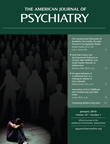Sex Differences in the Functional Neuroanatomy of Working Memory in Adults With ADHD
Abstract
Objective
Although attention deficit hyperactivity disorder (ADHD) in adults is associated with significant morbidity and dysfunction and afflicts both sexes, relatively few imaging studies have examined female subjects and none have had sufficient power to adequately examine sex differences. The authors examined sex differences in the neural functioning of adults with ADHD during performance of a verbal working memory task.
Method
The participants were 44 adults with ADHD matched on age, sex, and estimated IQ to 49 comparison subjects. Accuracy and reaction time on an N-back task were measured to assess working memory. The blood-oxygen-level-dependent functional MRI response was used as a measure of neural activity.
Results
A group-by-sex analysis of variance showed no between-group differences in either reaction time or percent correct for the working memory task. For both sexes combined, the adults with ADHD showed less activity than comparison subjects in prefrontal regions. However, sex-by-group analyses revealed an interaction, such that male ADHD subjects showed significantly less activity in right frontal, temporal, and subcortical regions and left occipital and cerebellar regions relative to male comparison subjects, whereas female ADHD subjects showed no differences from female comparison subjects. Exploratory correlation analyses revealed negative associations between working-memory-related activation and number of hyperactive symptoms for men and number of inattentive symptoms for women.
Conclusions
Male but not female adults with ADHD showed significantly altered patterns of neural activity during a verbal working memory task. Men and women showed different associations between neural activity and ADHD symptoms.



